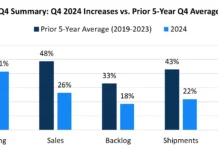by Michael J. Devereux II, CPA, CMP, Mueller Prost
With year-end approaching, plastics processors likely will benefit from year-end tax planning. With income taxes on the rise and guidance published daily, processors will need to consider a number of different available options to ensure they are (legally) minimizing their income tax burden.
First, income tax planning is not done in a vacuum. Taxpayers must look at the current year, as well as 2016, as some of the choices processors should consider include whether to accelerate or defer income from 2015 to 2016, or vice versa. So, when taxpayers analyze their options, they should run two years of projections to ensure the taxpayer and the planner understand what they are missing or obtaining by doing this planning.
Second, taxpayers should no longer concern themselves only with the income tax. The US has four sets of rules passing through an income tax return, and none of them correlate. Those include the income tax, alternative minimum tax (AMT), self-employment tax and the net investment income tax. Having a tax planner involved who understands that these do not correlate is extremely beneficial to taxpayers and ensures full advantage is taken.
The following is meant to provide plastics processors with some ideas and tips with respect to year-end tax planning.
Flow-through entities and related companies
Many small businesses are organized as flow-through entities, meaning the company’s income, deductions and credits are passed through to the owners of the company, with the owner responsible for the income tax associated with the items attributable to the entity. These include S Corporations, partnerships, LLCs and sole proprietorships. Therefore, tax planning for the company must be done in conjunction with the company’s owners.
Along those lines, owners of flow-through entities may have been limited to utilizing losses from prior years due to basis limitations, passive loss limitations or at risk limitations. Taxpayers must go through all three tests to obtain a loss associated with a flow-through entity. If the taxpayers flunk one of the tests, they must carry forward the losses under specific rules. Generally, this is a great place to start to determine whether owners can recognize their loss.
Moreover, for those owners who own their buildings in a separate entity and rent to the operating businesses, proper planning is necessary to coordinate the income tax items for both entities. For instance, rental real estate is a passive activity, with certain exceptions. Too often, the real estate entity generates a loss, which may only be offset with other passive income. However, under the right circumstances, taxpayers may group activities (a term of art for entities) on their tax returns. If the ownership is identical between the operating entity and the real estate entity, and the only income the rental entity realizes is rent received from the operating entity, the taxpayer may be allowed to group those two activities, thus allowing the real estate loss to offset income from the operating entity.
Tax assets
In addition to suspended losses due to basis, at risk or passive limitations, other tax assets may exist. These include net operating losses (NOLs) and credit carryforwards. Taxpayers have already “paid for” these items, and it is important to consider these tax assets to determine whether or not a taxpayer can trigger these to offset current year income or tax liabilities. Tax credits can be extremely beneficial to plastics processors. Tax credits are more valuable than a deduction or loss. Deductions or losses, while beneficial, merely reduce taxable income, where credits are dollar-for-dollar reductions in income tax liabilities.
Common tax credits in the plastics industry include, but are not limited to, the following:
- The R&D tax credit, which rewards companies for the development of part-specific manufacturing processes, mold design or automation techniques.
- The Work Opportunity Tax Credit (WOTC), which rewards companies for hiring within targeted groups of employees, such as qualified veterans, ex-felons or those on food stamps.
- The Fuel Excise Tax Credit, which refunds a portion of the excise tax paid on propane used in plant forklifts.
Proper planning and documentation is required in order to qualify for these credits. Working with specialists in these areas can increase these benefits significantly.
Tax extenders
“Tax extenders” are a host of over 50 provisions within the tax code that periodically expire, requiring Congress to renew annually or bi-annually. Many of these provisions expired on Dec. 31, 2014. Although passage is not guaranteed, Congress regularly and retroactively reinstates these temporary provisions.
Undoubtedly, these provisions will affect tax returns. They are broad in scope and affect every plastics processor operating in the US. Provisions affecting the plastics industry include, but are not limited to, the following:
- The R&D tax credit;
- The Work Opportunity Tax Credit;
- Bonus depreciation, which allows taxpayers to write off 50 percent of the cost basis of specific assets before they begin to depreciate their asset;
- Section 179 expensing election, which allows taxpayers to write off up to $500,000 of the cost basis for specific assets (this provision is phased out on asset purchases between $2 million and $2.5 million in property placed in service during the tax year); and
- Energy Efficient Building Deduction, which allows processors to accelerate depreciation related to energy efficient improvements related to lighting, HVAC and/or building envelope.
The US House and US Senate have taken a different tack in renewing these provisions. The US House is considering each provision separately, passing bills to make select provisions permanent. While the leadership on both sides of the political spectrum would like these provisions to be permanent, they disagree on how to pay for these provisions. Processors should not expect much traction with the US House bills, as President Obama has threatened to veto these provisions since there is not an offset to the cost of these provisions. The full US Senate has not yet taken up the tax extenders. However, the Senate Finance Committee passed the Tax Relief Extension Act of 2015 to extend these popular provisions for two years through Dec. 31, 2016. In addition, the Tax Relief Extension Act of 2015 improves many of these provisions. For instance, the bill would allow the eligible small businesses to use the R&D credit to offset the AMT and start-up companies to offset payroll tax liabilities.
Processors should monitor congressional progress with respect to these provisions, as they will certainly impact their year-end tax planning.
Other considerations
This year, processors will need to pay special attention to the reporting provisions that take effect this year with respect to the Affordable Care Act. These reporting requirements are not limited to large employers, and companies must ensure they are prepared to file the proper forms in a timely manner.
In recent years, many states have become more aggressive in assessing tax liabilities on companies not located in their state, arguing “nexus” within their state. While many states have exceptions for limited activities within their state, it is important to identify employees (typically sales employees) that may be soliciting business across the country, potentially providing nexus to that state. Proper planning for state and local taxes may be extremely beneficial to plastics processors and has the potential for lowering the overall income tax liabilities.
Conclusion
While there still are many unknowns due to congressional inaction, plastics processors would be well-suited to begin planning now to ensure their 2015 tax liability can be minimized within the law.
Michael J. Devereux II, CPA, is a partner at Mueller Prost, a CPA and business advisory firm, and leads Mueller Prost’s Plastics Industry Services group. Mueller Prost’s Tax Incentives Group is nationally recognized and has assisted hundreds of companies in the manufacturing sector to identify and utilize tax incentives. Mueller Prost is a member of MAPP and offers MAPP members three hours of complimentary tax and accounting advice. For more information, call 314.862.2070 or email mdevereux@muellerprost.com.




